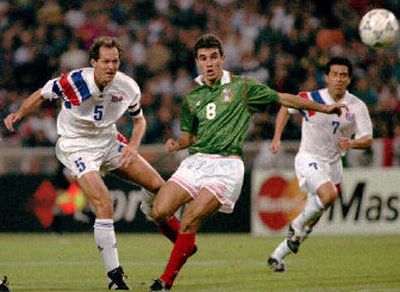Back to the basics

Retired professional soccer player Hugo Ernesto Perez is taking soccer back to its basics.
For the second year, Perez has come to Spokane from San Francisco to teach fundamental skills at the Soccer Edge Academy at Mead High School – skills he believes soccer clubs in the United States need to work on to succeed in the World Cup.
“I hold these camps because I want to teach soccer the proper way,” Perez said. “I’m not saying I’m the best coach, but when you play a lot of years professional, you play all over the world – you want to teach what you see all over the world.”
Perez was born in 1963 in El Salvador, where the game of soccer is not just the No. 1 sport – it’s a passion. He was 4 years old when he started to learn his technical skills from playing in the streets. When Perez was 11 he moved to the U.S., but it wasn’t until the age of 16 that he began to learn the tactics of soccer.
“Here we need to teach those things because kids don’t grow up like that,” Perez said.
Perez competed for the U.S. in the 1984 Summer Olympics and World Cup. He played in 73 international matches for the U.S. from 1984 to 1994 and also played professionally in France, Norway, El Salvador and Saudi Arabia.
Since his retirement from playing seven years ago, he has worked in San Francisco, conducting camps for the University of San Francisco and other clubs.
“I think that’s the only advantage I have over other people who are coaching that probably did not play professional or in the World Cup,” Perez said. “I want to give that experience because I feel that the United States has the potential to be a World Cup winner.”
Perez believes the path to success for the U.S. in the World Cup starts with teaching the basics to young children.
“Here in America, especially at the youth level for those kids who have a chance to go to the World Cup and not just to compete, but to do well, we need to develop them into good, technical players,” he said. “That is what’s lacking in youth soccer.
“As big as we are we should be able to always compete beyond the first and second round of the World Cup.”
The retired professional teaches dribbling, passing, skillful moves with the feet and other basic drills.
While reaching the World Cup level takes hard work from the player, parents also play a crucial role in their child learning the proper way to play soccer. Perez said there are two different camps: recreational and competitive.
“Competitive is for kids and parents who are serious and see enough potential in their children that they want to be able to develop into better players later,” he said.
Perez said if a child is placed in an advanced camp, the young player will learn the basics that can get them to the highest level.
He believes the U.S. needs a youth development program that emphasizes fundamental skills starting when the child is 6, where the focus in more on teaching, not coaching.
“There are some things we get caught up in such as winning tournaments, and that’s what usually matters in club,” Perez said. “Winning should not be the goal – it should be to develop players and get them to the level of competing with the national team.”
The national team has started to recruit players who are 14 or younger and placing them in different academies in the U.S. so they can start at an early age, like their global competition.
“Compare Brazil and Argentina with us and we still have a long way to go,” Perez said. “I think we have good athletes in this country, but soccer is not as popular as it is in other countries.”
When Perez compares Brazil and Argentina’s talent with that of the U.S., he thinks the South America teams have something not many teams do – creativity. He said they’re “out of the ordinary” when they play soccer, but still encompass the basic fundamentals – therefore are a favorite of Perez.
“They stay within the system that their coaches want them to play, but at the same time every player in every position is creative enough to do certain things out of the ordinary,” he said.
“We need to start working toward developing those players to the level of the other countries who are usually in the finals every year,” Perez said.